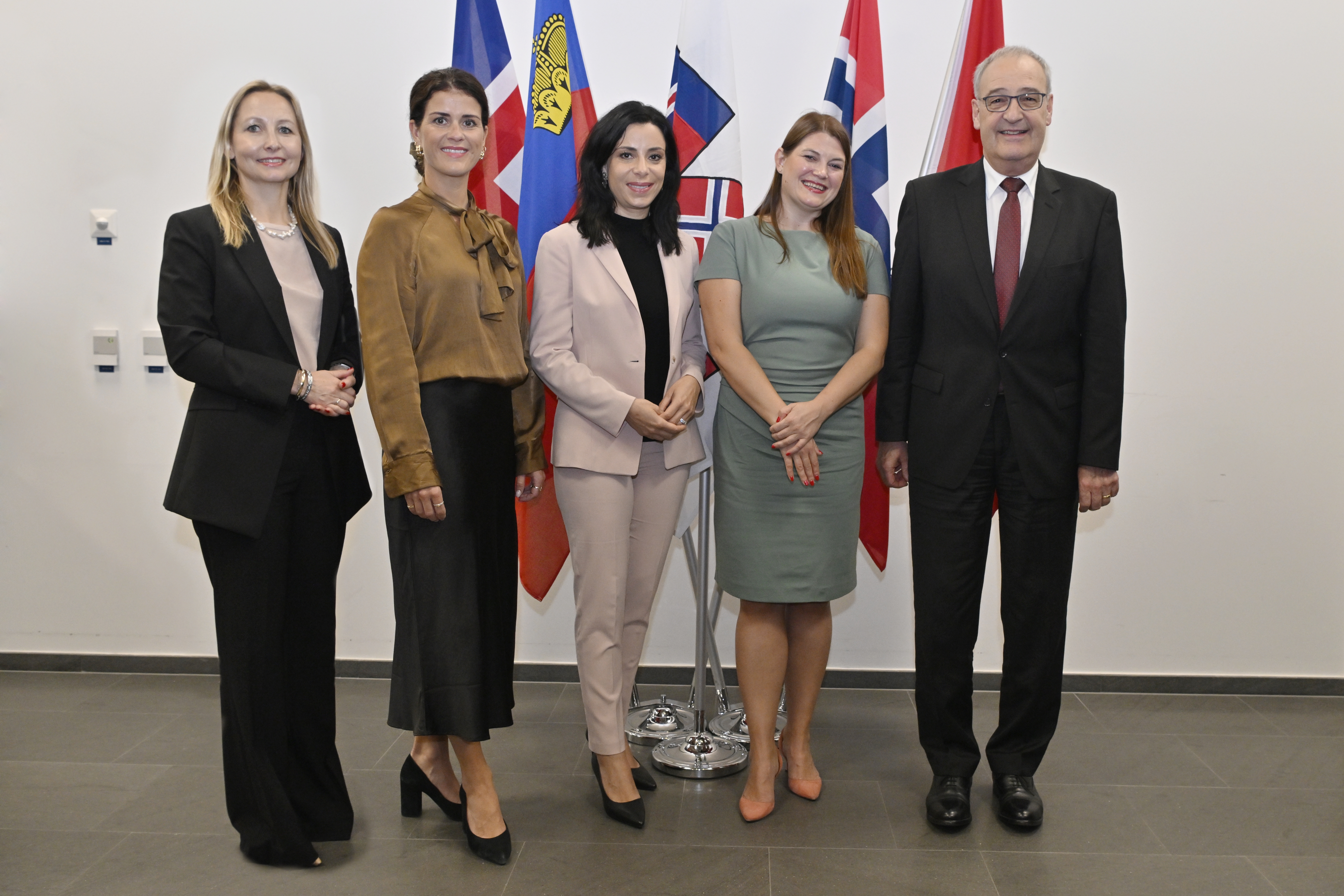The meeting was chaired by Mr Guy Parmelin, Federal Councillor of Switzerland. Ministers of the four EFTA States (Iceland, Liechtenstein, Norway and Switzerland), together with Mr Alberto van Klaveren, Minister of Foreign Affairs of Chile, signed a Protocol of Amendment modernising the Free Trade Agreement between EFTA and Chile.
EFTA Preferential Trade Relations
Ministers welcomed the significant advances made in EFTA’s global trade relations since their last meeting in June 2023. They celebrated the signature of the Protocol of Amendment with Chile, which would further strengthen trade ties between the parties.
Ministers further welcomed the conclusion and signing of the Trade and Economic Partnership Agreement (TEPA) with India in March 2024 and expressed their hope that its entry into force would be swift. With the addition of India, the extensive network of bilateral and preferential trade agreements of the EFTA States now covers 80.7% of EFTA’s global trade, bringing new opportunities and further enhancing stability and competitiveness for EFTA’s businesses in a time of flux. Ministers discussed the way forward to implement the TEPA, including preparations for activities foreseen on investment promotion and cooperation, and looked forward to active engagement with all EFTA stakeholders and Indian partners to deliver benefits for all parties.
Ministers took stock of ongoing processes and agreed to continue to work intensively towards a swift finalisation of the agreement with Mercosur. They further underscored the importance of concluding negotiations with Kosovo, Malaysia, and Thailand, as well as a digital economy agreement with Singapore and a modernised agreement with Ukraine. They expressed their commitment to continue modernising existing agreements and underlined their willingness to advance negotiations with Vietnam.
Ministers highlighted the growing importance of horizontal issues that go beyond the traditional free trade negotiation agenda, and welcomed the ongoing work within EFTA to continue to add value to its third-country activities. This is especially notable in the areas of sustainable development, where EFTA has continued to monitor the implementation of the sustainable development provisions of its free trade agreements. Similarly, Ministers welcomed the progress achieved in producing an ex-ante sustainability impact assessment on its negotiations with Thailand.
Ministers also noted progress on other important horizontal files, including recently expanded preference utilisation monitoring and the inclusion of EFTA’s new model chapter on SME.
Ministers discussed potential future activities for EFTA, including structured dialogues with relevant trading blocs or nations, and the development of closer engagement with new partners.
In closing, Ministers reaffirmed the importance of EFTA as a common trade and economic cooperation platform in a global environment that is becoming increasingly multi-faceted and complex. They agreed to continue strengthening and deepening cooperation between the four Member States on trade matters with a view to remain competitive and fit for purpose in a changing geo-economic landscape.
Relations with the European Union
Ministers reiterated the importance of the close and shared-values-based cooperation with the European Union (EU) in the current geopolitical environment. In this context, Ministers underlined the important coordination between the EEA EFTA States and the EU on pressing issues, including the implementation of sanctions against Russia and Belarus.
Ministers welcomed the progress made so far in 2024 to reduce the number of legal acts awaiting incorporation into the EEA Agreement. They underlined the EEA EFTA States’ commitment to reduce the number of acts outstanding to uphold legal certainty and homogeneity in the European Economic Area.
They emphasised the importance of continuing the work on assessing EU horizontal initiatives that may have implications for the EEA EFTA States.
Ministers stressed the need to highlight that the EEA EFTA States are an integral part of the Internal Market, European supply chains and the European twin green and digital transitions, and that the EU must consider its EEA obligations, including in its trade policy. The Internal Market covers 30 states, not only 27 states, and it is in the joint interest of all the States that the EEA EFTA States are included in its strategic evolution.
Ministers underlined the importance of pursuing outreach activities to strengthen awareness and knowledge of the EEA Agreement, particularly in relation to the new EU legislature. To this end, they welcomed activities undertaken in relation to the 30th anniversary of the EEA Agreement in 2024.
Relations between Switzerland and the EU
Ministers were informed about the ongoing negotiations between Switzerland and the European Union (EU), which began in mid-March 2024. Negotiations cover a new package of agreements, with a view to stabilizing and further developing their bilateral relations to the benefit of both sides. The negotiation package is a bundle of several thematic elements, including new agreements and institutional solutions.
Advisory Bodies
Ministers met with EFTA’s two advisory bodies, the Consultative Committee and the Parliamentary Committee, for their regular dialogue on EFTA activities. Parliamentarians and representatives from trade unions and employers’ organisations from the four EFTA States discussed EFTA’s trade policy, including the state of play in current processes and possible future orientation. They also touched on the nexus between EU/EEA sustainability provisions and the trade policies of the EFTA States.
Attending:
Switzerland: Mr Guy Parmelin, Federal Councillor, Head of the Department of Economic Affairs, Education and Research (Chair)
Iceland: Ms Thórdís Kolbrún Reykfjörd Gylfadóttir, Minister for Foreign Affairs
Liechtenstein: Ms Dominique Hasler, Minister of Foreign Affairs, Education and Sport
Norway: Ms Cecilie Myrseth, Minister of Trade and Industry
EFTA Secretariat: Ms Siri Veseth Meling, Secretary-General
EFTA Ministerial 2024 Communiqué
Conclusions on EFTA internal and external relations
Conclusions on Standing Committee
